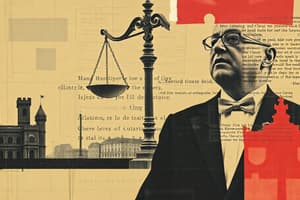Podcast
Questions and Answers
What is the main purpose of Article 13(3)?
What is the main purpose of Article 13(3)?
- To protect the freedom of occupation
- To restrict the establishment of schools
- To allow the government to restrict residence
- To prohibit retroactive legislation of criminal law (correct)
What is the consequence of disobeying a resident's demand to vacate their premise?
What is the consequence of disobeying a resident's demand to vacate their premise?
- The same punishment will be applied as if you intruded into the residence (correct)
- You will be barred from entering Seoul
- You will be punished for a crime
- The government will restrict your residence
What is the exception to the freedom of occupation?
What is the exception to the freedom of occupation?
- If the occupation is illegal (correct)
- If the occupation is for public welfare
- If the occupation is not approved by the resident
- If the occupation is restricted by the government
What is the effect of retroactive legislation of criminal law?
What is the effect of retroactive legislation of criminal law?
What is the purpose of Article 16?
What is the purpose of Article 16?
What is the consequence of failing to comply with a notice of call for military service without justifiable grounds under Article 88 of the Military Service Act?
What is the consequence of failing to comply with a notice of call for military service without justifiable grounds under Article 88 of the Military Service Act?
What is the contemporary understanding of the right protected by Article 17?
What is the contemporary understanding of the right protected by Article 17?
What is the significance of the 2018 Constitutional Court ruling on military service law?
What is the significance of the 2018 Constitutional Court ruling on military service law?
What is a key aspect of the freedom of religion guaranteed by Article 20?
What is a key aspect of the freedom of religion guaranteed by Article 20?
What is the principle underlying the relationship between the government and religion, as stated in Article 20?
What is the principle underlying the relationship between the government and religion, as stated in Article 20?
Study Notes
Retroactive Law and Double Jeopardy
- A retroactive law is an act that looks backward or contemplates the past, affecting acts or facts that occurred before the enactment of that law.
- Retroactive legislation of criminal law is unconstitutional.
- Prohibition of deprivation of rights by retroactive legislation.
- Double Jeopardy: multiple punishment for one crime is prohibited.
Freedom of Residence and Movement
- The government cannot restrict your residence to a specific location.
- The government cannot bar your entry into a specific location.
- You can travel to any place.
Freedom of Occupation
- Any activity for a living is allowed unless the activity is illegal.
- Legal occupation can be restricted for the public welfare.
- Freedom of occupation includes the freedom of enterprise.
Right to Privacy and Protection of Personal Information
- The right to be left alone without any interruption from outside.
- Inviolableness of private information and its management.
- People can communicate without any intervention from third parties.
Freedom of Conscience
- Conscience: an individual's thoughts and judgments about the value and nature of external things.
- Both the creation and expression of conscience are left to individuals.
- Not forced to do what you don't want to.
Freedom of Religion
- Whether to have a religion or not, and choice of religion are free.
- Also free to change their religions.
- Freedom of religion includes: Freedom of religious rituals, Freedom of missionary work, Freedom of assembly or association, and Freedom of education.
- No state religion: the government cannot urge people to believe a certain religion and provide a certain religion with privileges over other religions.
Freedom of Speech
- Freedom of speech denotes the freedom to make personal or official speeches, the freedom to form opinions and to express them.
Studying That Suits You
Use AI to generate personalized quizzes and flashcards to suit your learning preferences.
Description
Test your understanding of retroactive laws, which affect past events, and double jeopardy, a prohibition against multiple punishments for one crime. Learn about the unconstitutionality of retroactive legislation in criminal law and more.





